The pilgrimage blues and the peeling of Self: A conversation between Kierkegaard and Richard Rohr.
Did Mary had the pilgrimage blues too? A conversation and a blessing for the weary pilgrim.
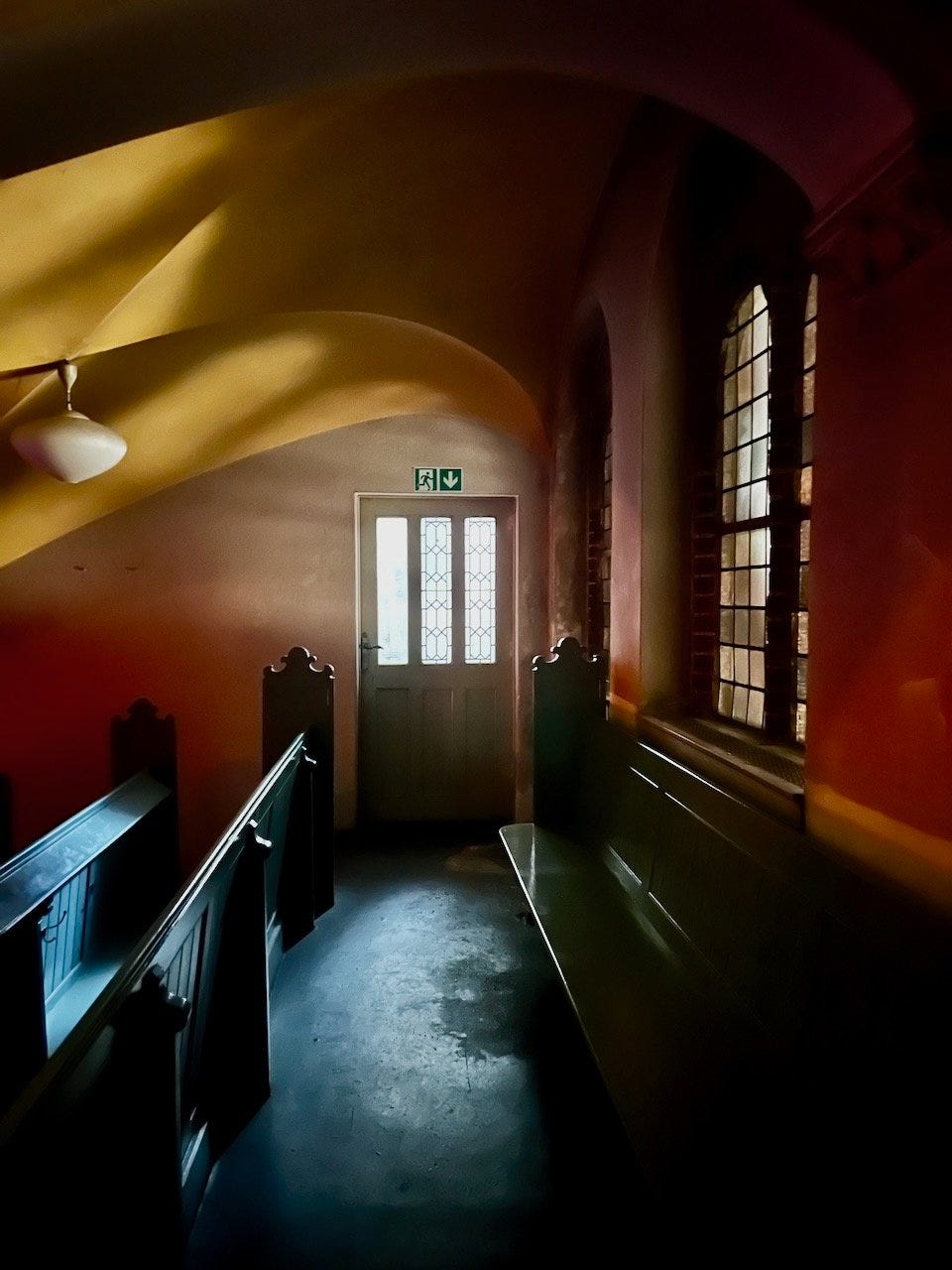
Dear fellow pilgrim on the deeper path,
Have you ever had the pilgrimage blues? When the days of new beginnings are over, the feet start hurting and the back aches? When the fog descends and you have lost sight of your destination?
Some wise people tell us that is when the pilgrimage truly begins. And that it might be a long dance ahead.
Others sell us prepackaged journeys with well-defined goals. They are usually more expensive but also shorter. Because the arrival time needs to be before one gets too weary of the whole thing. People flock to these famous teachers who sell wisdom like seven-step programs. But when it comes to existence, the learning becomes harder and the path becomes steeper.
“One needs to dig deep in order to build up… ,” quips Kierkegaard.
There is no prepackaged answer. The answer must arise in the heart of the pilgrim. Just as good blues arises in the heart of the singer.
So today, I offer you some “fragments”—a nod to Chuck, who reminded me of this venerable philosophical tradition—fragments of my pilgrimage blues. These are the moments that settle in when the feast days are over, and the reality of a world in peril begins to sink in.
Among them is the image of sitting Richard Rohr and Søren Kierkegaard at a table, pouring them some wine, and talking about the deeper self. 🙂
But first I want to give thanks to each of you reading and hearing these Cloister Notes. Thanks for being with us on the way. I am particularly grateful to all, who just arrived here, and to all who write with comments, either in our shared comment section or by responding via email, and who share connections to your own thinking. It might take some time, but I try to answer every one personally.
Particular thanks go to Bruce today, who has encouraged me to continue sharing photos and meditations. Thus, when I came across these pics I made 2 years ago during our sabbatical stay at the City Cloister in Berlin, Germany, I thought about you. So this blessing, dear Bruce, is for you.
For all kindred souls, who are also supporting this labor of love as paid or founding members - I am looking forward to our upcoming Winter Solitude retreat at the end of February. Invitations will be out soon.
With love, Almut
1:
Did Mary have the pilgrimage blues? When she delivered her baby into the hay, assisted by the clumsy hands of her husband? When relatives who had filled the inn peeked into the stable? When shepherds and strangers arrived to catch a glimpse of her son? When exhaustion set in after the strenuous journey and the labor of delivery?
And what about you? Did the old Christmas tale still stir something in you? Can you make sense of its connection to the story of the deeper self?
If anything has become clearer to me during this last 12 Days of Christmas journey, it is that the Christmas story is, at its core, an existential project. It is the road to the deeper self for anyone who dares to risk the journey. And like any birth, it comes with resistance, roadblocks, and the intense labor that transformation demands.
While leaning into the pilgrimage blues, I found myself returning to Richard Rohr’s reflections on the true self.
With “Immortal Diamond,” a phrase he took from the Jesuit teacher Gerard Manley Hopkins he refers to our immortal self, “the real you that has been there all along, hidden under the trappings of ego and False Self.” Rohr says (listen here). And, he probably would agree that our pilgrimage, especially the weary parts, are when we shed the layers of ego.
“Life is not a matter of creating a special name for ourselves, but of uncovering the name we have always had. We need ego to help us function, succeed, and belong. But if we let it stay in charge, ego stands in the way of living freely and authentically, from our God-given identity and calling.”
So what then is the true self? According to Rohr, it is “who you objectively are in God,” not “the manufactured self” but more the essence of all, “the soul” (listen here).
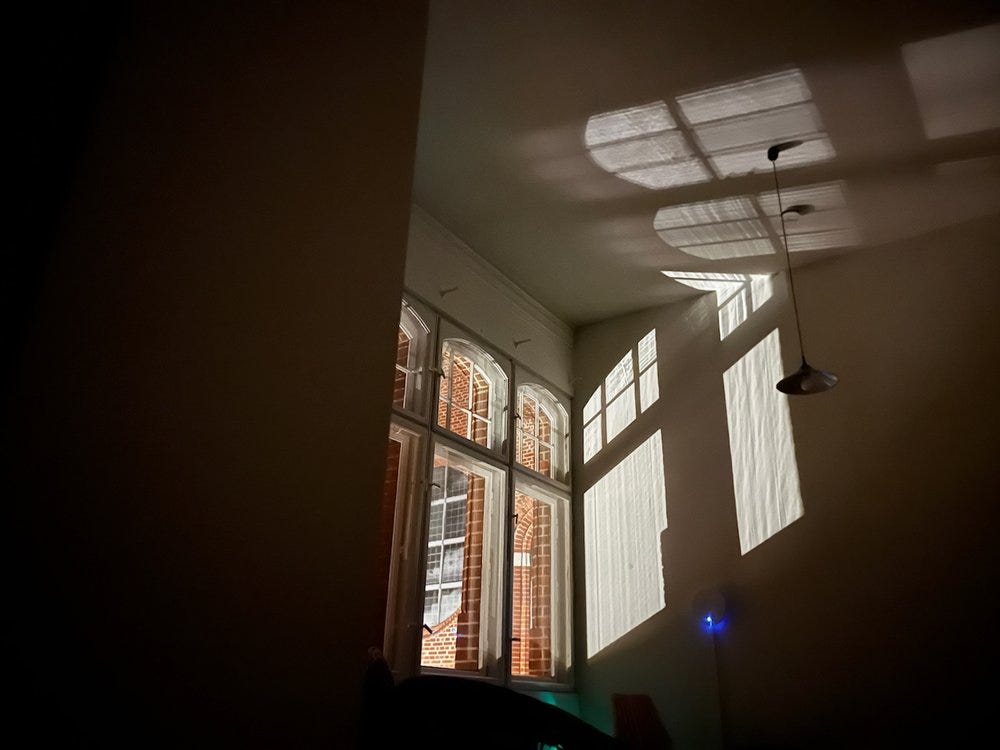
2:
Don’t you think sitting RICHARD ROHR and SØREN KIERKEGAARD at a table would make for an interesting conversation?
And so while pouring them wine we ask them if they in fact have the same understanding of the deeper self, perhaps just using different images?
To become a “self before God” is the Kierkegaardian phrase and it sums up the Dane’s life’s work. Every text, philosophical or spiritual, was experimenting with that journey, reminding the reader of the forgotten self, the one we become when we contemplate our human lot and hold it into Divine light.
But is arriving at the soul arriving at the “true self,” as Richard Rohr has it? And is it the deeper self Kierkegaard has in mind? It almost sounds, like the “true self” in the “immortal diamond” image is some thing we can find when we we are finally done pealing all the layers of ego away which were hiding it. Then our “true self” appears like a shiny diamond at the bottom of our core being, just waiting to be discovered by us.
Kierkegaard sips some wine and nods lightly. But, he whispers, there is no way to escape the “manufactured self.” Because, even arriving at the insight that we are immortal in the eyes of God, truly seen, a child of God, some one needs to relate to that very insight. Someone who becomes aware of her own manufacturing and thus her freedom to choose to relate to herself differently, to retell her story in a new light, and in doing so to become the self before God. We cannot overcome our ego, we can just transform it. That is the task of the self. That is the self.
So we deepen our self by walking. By realizing the manufactured parts and our degrees of freedom to let go of them. Both, Kierkegaard and Rohr agree that there is some “dying away” to do in this deepening process. Which brings me back to the pilgrimage blues.
3:
“Falling upward,” Richard titles one of his books. And so, when we particularly felt the pilgrimage blues creeping up on us during our last sabbatical, we took him literally.
We packed our pilgrimage blues and our toddler and got up—all the way up on our church tower, which, in fact, we could do in our city cloister home without even leaving the house :-)
Towers have been since mankind symbolic places. We descend into deepening and ascend to be enlightened. And enlightened we truly were. Standing on the mountain top or a tower lets you see your surroundings in a new perspective. As you become smaller your sorrows loose their sting. It does not mean to belittle your sorrows nor to forget about them. It means to escape despair by stepping into freedom. Looking over the rooftops does help. It offers perspective and consolation.
There are some towers you want to avoid, like the ivory tower of the isolated philosopher, or the watch towers that used to split Berlin in half. But towers also elevate our view and remind us of the bigger picture.
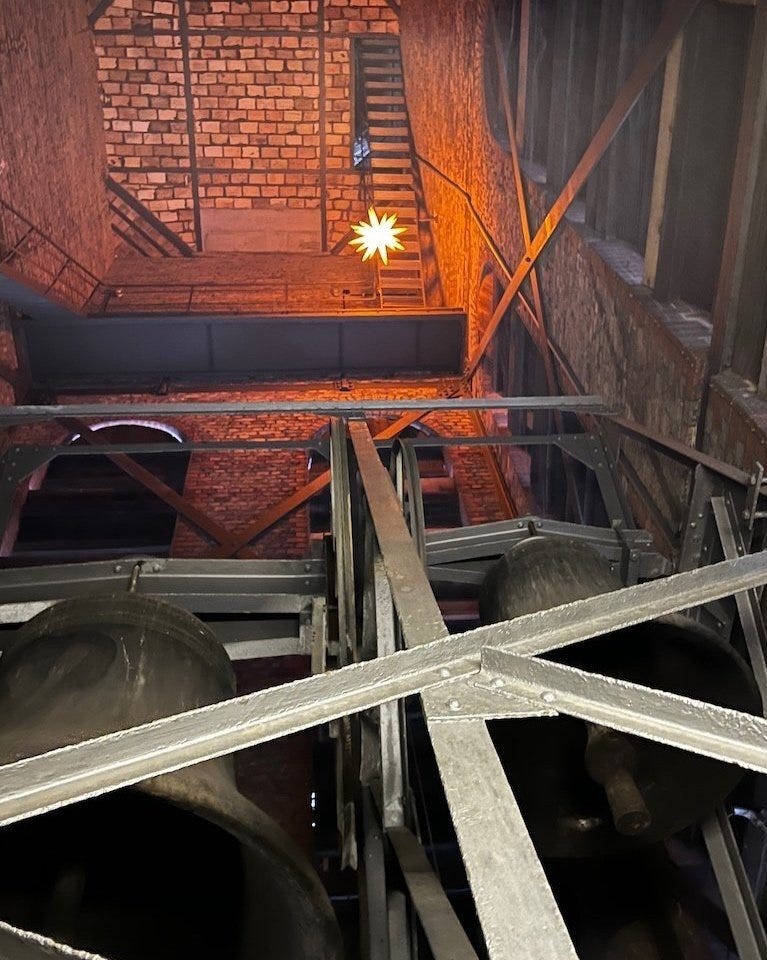
4:
A blessing for the weary pilgrim
You do not need to know
the ending
not even the beginning
you do not need to walk it all at once
a regular pause might be required
to gain the courage
for the next step.
You do not need to carry
the pain of the whole world
your own cross will suffice.
What you truly need
is faith
not may be
the faith from your childhood days
in a God who will fix it
but the faith
of the weary pilgrim
complicated and worn,
but still:
there is hope
and always a next step
on our falling upward.
So pause
and then walk
and then again.
Amen.
About Almut
Almut Furchert, Dr. phil., Dipl. Psych. is a German American scholar and practitioner, a psychologist turned philosopher turned writer, traveler, photographer, retreat leader and mother of a kindergartener. She has taught and published on authors like Kierkegaard, Buber, Frankl, Yalom, Edith Stein, and Hildegard of Bingen. Almut is also a Benedictine Oblate and lives with her family in a little college town in MN.
Thank you for reading, sharing and supporting Cloister Notes, a letter for dancing monks, weary pilgrims and wounded healers in the intersection of psychology, philosophy and spirituality.
If you do not want to receive further midweek blessings you can manage your subscription here.





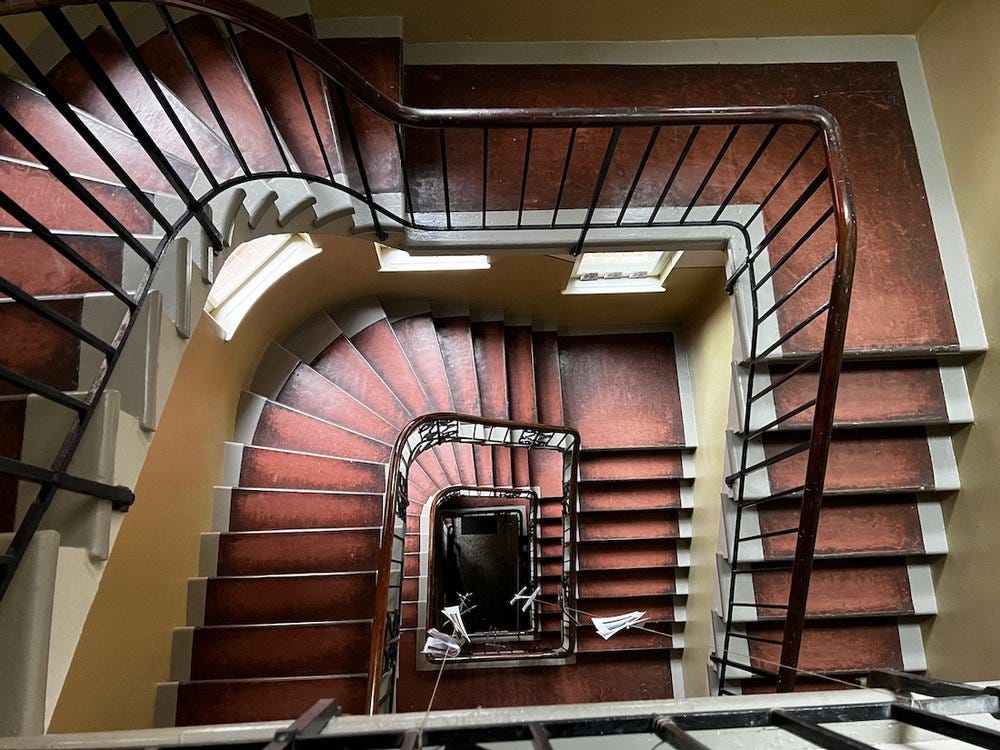

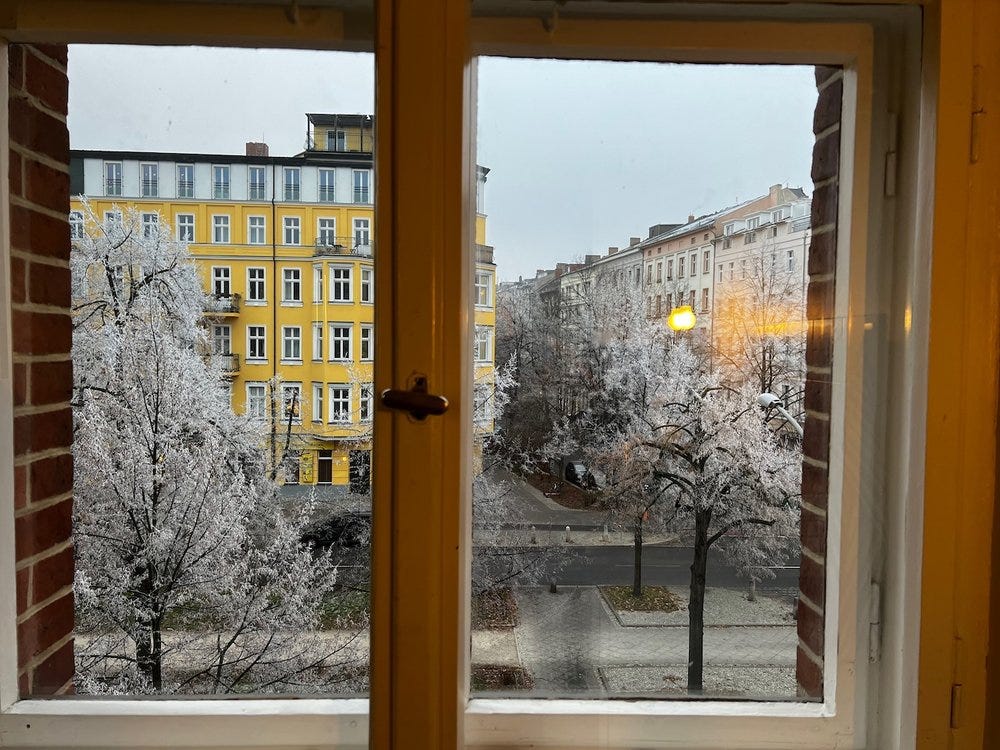
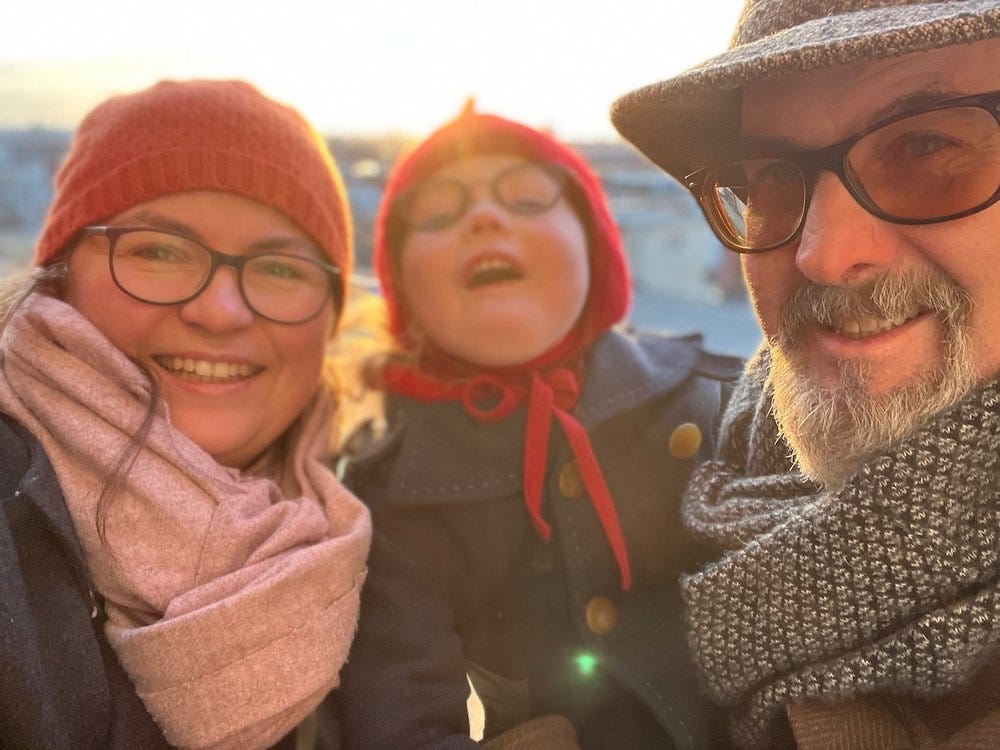
You always encourage this weary pilgrim's soul. Thank you for your beautiful reflections... I plan to print the blessing to keep on my desk. "You do not need to carry the pain of the whole world
your own cross will suffice." Oh my. This really resonates and comforts. Thanks again.